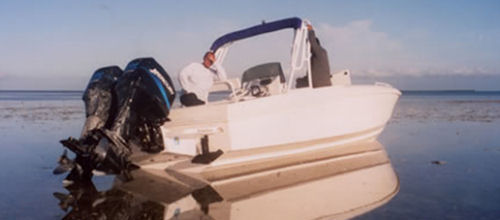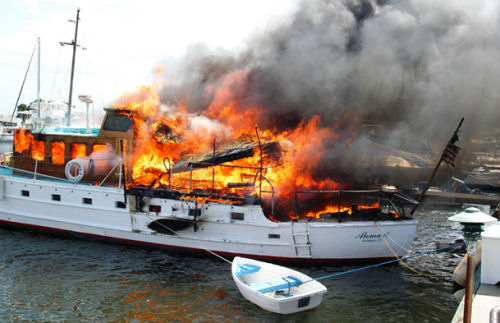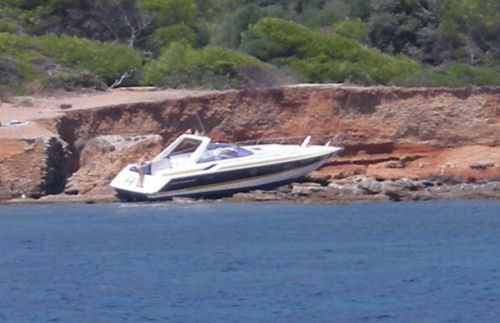How Far Does Rendering Assistance Go?
If you came upon the boat pictured above we’d like to think that you’d stop and help in any way you could. But just what does that mean? Could doing the right thing lead to something going horribly wrong? To get answers to these questions and others we sent Capt. Steve to sit down with the folks at our new sponsor, Sea Tow.
 “To tow, or not to tow,” that is the question. And it is a complicated one. But there is a right answer. |
Capt. Steve Says…
It’s a rare occurrence that one boater would see another boater in a jam and not stop to help in some way. But in some instances the help you are providing could be the wrong kind of help. In most, but not all cases, recreational boaters are simply ill equipped to handle their own problems, let alone the problems of others. But that doesn’t’ stop them from doing what they think is the right thing.
 Certainly, coming upon a scene like this limits your ability to help, but you can check the waters surrounding the scene for survivors that you can take aboard.
|
Are Our Boats Equipped To Handle It?
Well, if “it” means saving a saving a sinking vessel, or battling a boat fire, or even towing a disabled boat, then the answer is probably no. Our boats are, however equipped to do the job they were designed to do, give us a good and safe day on the water. Being the “go to” guy with that boat is another matter entirely. Let’s take the most common problem, a disabled boat and see what can be done right and what can be done wrong.
 Sometimes pulling a boat off the rocks can, and will, do more harm than good. You just may sink it in a more inconvenient place.
|
What Could Go Wrong?
Let’s say you’re cruising through the sound and happen upon a disabled boat. What could have disabled this boat? Any number of things according to Joe Frohnhoefer, VP of Sea Tow. The top five breakdowns, in no particular order are...
- Mechanical – when you only use your boat on a few weekends a year, seals dry out, belts dry and crack, plugs foul… it’s not a recipe for a smooth operation.
- Dead Battery – – spend all day swimming off your boat with the radio cranking, electric grill cooking, 12 volt refrigerator running, and you’re likely to kill off your battery and be stuck. Did you leave your battery switch on both?
- Fuel Exhaustion – as if that ever happens!
- Grounding
- Propeller Entanglement – It’s a simple matter of driving over your anchor line, running over a stray line floating on the water, leaving a dock line dangling over the side... you’d be surprised.
So we come upon a disabled boat. Do we tow it in? Maybe not if it’s a stranger’s boat. What if it was a buddy? How about a swimsuit model? Ever increasing likelihoods that we’d toss him or her a line. Now, what line would that be? A dock line? Probably not long enough. An anchor line? More likely, but they usually aren’t up to the rigors of towing with a certain amount of stretch and a high breaking strength.
But let’s continue and say your guy passes you his anchor line. Where are you going to secure it? Your aft cleat? You’re likely to pull that right out of the gunwale if towing from a single quarter doesn’t end up swamping you. How about setting up a bridle to tow from a centerline? Depending on the size of the tow, you may, and likely will, pull two cleats out instead of one. According to our friends at Allstate Insurance, they report a minimum of $550 damage resulting from recreational boats towing one another. And what if that towline parts? Are you keeping everyone clear of the line in case it snaps and whips back? How far can you get from that line on your bowrider? Not very, I’m guessing.
So What’s a Guy To Do?
Well since you still want to render assistance, the thing to do is call someone who is qualified to handle the problem, and then either wait till they arrive before you leave, or at least verify that they are on the way and are headed to the right location. So who ya gonna call? The Coast Guard is only concerned with saving life and limb. If either is in peril, then certainly a call to them would be in order. On the other hand, for any of the problems mentioned above, or a host of others where life is not in peril, a commercial tow boat would be the call of choice. Why? Because they are better equipped to handle the problem than you are. Add to that the fact that your insurance carrier may, in most cases, void your policy if you damage your boat or cause harm by engaging in risky endeavors such as towing another boat. Get out your policy and check.
The Sea Tow Boat
For towing, according to Frohnhoefer, Sea Tow boats are fitted with dedicated tow points that are mounted more in the center of the boat, for better controllability. They have flashing safety lights to warn others that a boat is in tow and to exercise caution while nearby. Plus their towlines are specifically made to handle the job at hand. “Our towlines are typically fabricated from a blend of synthetics to allow for up to a 10% stretch (which saves damaging the boats) and a high breaking strength… typically with a minimum of 10,000 lbs for inshore work, and a minimum of 50,000 for offshore.”
But That’s Not All
Frohnhoefer also tells us that their typical Sea Tow boat is equipped with emergency gas supplies, a host of tools for basic mechanical repairs, belts and hoses, and in some cases, even a supply of spare props. What, no spare steaks or beer? Now we’ve gotten emails at BoatTEST.com about extreme cases of a tow boat filing a salvage claim for a percentage of the boat’s value. Frohnhoefer says those cases are extreme and usually take place in conditions where they have actually encountered a boat that was in peril and they prevented a catastrophe from occurring. And, since the boat owner and Sea Tow didn’t have time to sign off on a contract, the owner chooses not to pay. In nearly all cases, Sea Tow boats will secure an agreement of payment before even leaving the dock. And even if happening upon the scene, they have a stack of contracts onboard so there are no surprises afterwards.
Yes, the law says you must render assistance if doing so won’t put you in harm’s way. And more often than not, the best form of assistance you can provide is to call for qualified help and then ensure that the help you called for is indeed on the way. Having done that, you won’t be damaging your boat, injuring others due to your, or their, inexperience, and you can sleep well knowing that you did the right thing...and that somebody’s lawyer won’t be calling on you the next day.